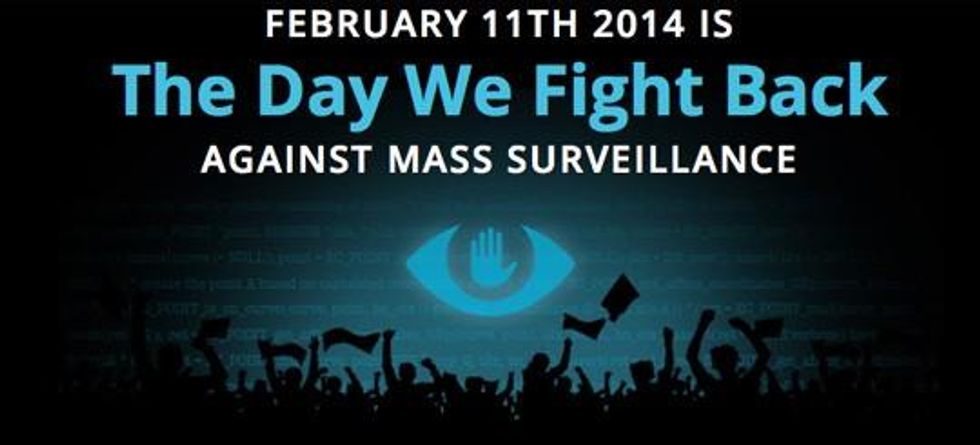Snowden Used Cheap, 'Web Crawler' Software to Collect NSA Files
Thousands of websites on Tuesday will take a stand against government surveillance

Whistleblower Edward Snowden who alerted the world to America's out of control National Security Agency reportedly used cheap and widely available software to scoop up thousands of files on the NSA's online activities.
The New York Times Sunday quoted a senior US intelligence officials as saying: "We do not believe this was an individual sitting at a machine and downloading this much material in sequence,"adding that the process was "quite automated."
The spider can be programmed to jump from website to website following embedded links and copying everything in its way. Snowden reportedly set the right algorithm for the software that indicated subjects and how far it was to follow the links. The whistleblower was reportedly able to gain access to 1.7 million files, including NSA's internal "wiki" materials that are used to share data across the world.
Through his lawyer at the American Civil Liberties Union, Mr. Snowden did not specifically address the government's theory of how he obtained the files, saying in a statement: "It's ironic that officials are giving classified information to journalists in an effort to discredit me for giving classified information to journalists. The difference is that I did so to inform the public about the government's actions, and they're doing so to misinform the public about mine."
This coming Tuesday, February 11, thousands of websites will take a stand against government surveillance by plastering protests across their home pages.
'The Day We Fight Back,' will give a big boost of support for the USA Freedom Act, which would end or curtail many of the most controversial surveillance programs at the National Security Agency (NSA) and elsewhere.
"The idea is to really harness the outrage of the Internet community in speaking out in one big voice on Feb. 11," said Rainey Reitman, the director of activism at the Electronic Frontier Foundation.
According to Josh Levy of Free Press: "Since the first revelations last summer, hundreds of thousands of Internet users have come together online and offline to protest the NSA's unconstitutional surveillance programs. These programs attack our basic rights to connect and communicate in private, and strike at the foundations of democracy itself. Only a broad movement of activists, organizations and companies can convince Washington to restore these rights."

An Urgent Message From Our Co-Founder
Dear Common Dreams reader, The U.S. is on a fast track to authoritarianism like nothing I've ever seen. Meanwhile, corporate news outlets are utterly capitulating to Trump, twisting their coverage to avoid drawing his ire while lining up to stuff cash in his pockets. That's why I believe that Common Dreams is doing the best and most consequential reporting that we've ever done. Our small but mighty team is a progressive reporting powerhouse, covering the news every day that the corporate media never will. Our mission has always been simple: To inform. To inspire. And to ignite change for the common good. Now here's the key piece that I want all our readers to understand: None of this would be possible without your financial support. That's not just some fundraising cliche. It's the absolute and literal truth. We don't accept corporate advertising and never will. We don't have a paywall because we don't think people should be blocked from critical news based on their ability to pay. Everything we do is funded by the donations of readers like you. Will you donate now to help power the nonprofit, independent reporting of Common Dreams? Thank you for being a vital member of our community. Together, we can keep independent journalism alive when it’s needed most. - Craig Brown, Co-founder |

Whistleblower Edward Snowden who alerted the world to America's out of control National Security Agency reportedly used cheap and widely available software to scoop up thousands of files on the NSA's online activities.
The New York Times Sunday quoted a senior US intelligence officials as saying: "We do not believe this was an individual sitting at a machine and downloading this much material in sequence,"adding that the process was "quite automated."
The spider can be programmed to jump from website to website following embedded links and copying everything in its way. Snowden reportedly set the right algorithm for the software that indicated subjects and how far it was to follow the links. The whistleblower was reportedly able to gain access to 1.7 million files, including NSA's internal "wiki" materials that are used to share data across the world.
Through his lawyer at the American Civil Liberties Union, Mr. Snowden did not specifically address the government's theory of how he obtained the files, saying in a statement: "It's ironic that officials are giving classified information to journalists in an effort to discredit me for giving classified information to journalists. The difference is that I did so to inform the public about the government's actions, and they're doing so to misinform the public about mine."
This coming Tuesday, February 11, thousands of websites will take a stand against government surveillance by plastering protests across their home pages.
'The Day We Fight Back,' will give a big boost of support for the USA Freedom Act, which would end or curtail many of the most controversial surveillance programs at the National Security Agency (NSA) and elsewhere.
"The idea is to really harness the outrage of the Internet community in speaking out in one big voice on Feb. 11," said Rainey Reitman, the director of activism at the Electronic Frontier Foundation.
According to Josh Levy of Free Press: "Since the first revelations last summer, hundreds of thousands of Internet users have come together online and offline to protest the NSA's unconstitutional surveillance programs. These programs attack our basic rights to connect and communicate in private, and strike at the foundations of democracy itself. Only a broad movement of activists, organizations and companies can convince Washington to restore these rights."


Whistleblower Edward Snowden who alerted the world to America's out of control National Security Agency reportedly used cheap and widely available software to scoop up thousands of files on the NSA's online activities.
The New York Times Sunday quoted a senior US intelligence officials as saying: "We do not believe this was an individual sitting at a machine and downloading this much material in sequence,"adding that the process was "quite automated."
The spider can be programmed to jump from website to website following embedded links and copying everything in its way. Snowden reportedly set the right algorithm for the software that indicated subjects and how far it was to follow the links. The whistleblower was reportedly able to gain access to 1.7 million files, including NSA's internal "wiki" materials that are used to share data across the world.
Through his lawyer at the American Civil Liberties Union, Mr. Snowden did not specifically address the government's theory of how he obtained the files, saying in a statement: "It's ironic that officials are giving classified information to journalists in an effort to discredit me for giving classified information to journalists. The difference is that I did so to inform the public about the government's actions, and they're doing so to misinform the public about mine."
This coming Tuesday, February 11, thousands of websites will take a stand against government surveillance by plastering protests across their home pages.
'The Day We Fight Back,' will give a big boost of support for the USA Freedom Act, which would end or curtail many of the most controversial surveillance programs at the National Security Agency (NSA) and elsewhere.
"The idea is to really harness the outrage of the Internet community in speaking out in one big voice on Feb. 11," said Rainey Reitman, the director of activism at the Electronic Frontier Foundation.
According to Josh Levy of Free Press: "Since the first revelations last summer, hundreds of thousands of Internet users have come together online and offline to protest the NSA's unconstitutional surveillance programs. These programs attack our basic rights to connect and communicate in private, and strike at the foundations of democracy itself. Only a broad movement of activists, organizations and companies can convince Washington to restore these rights."


